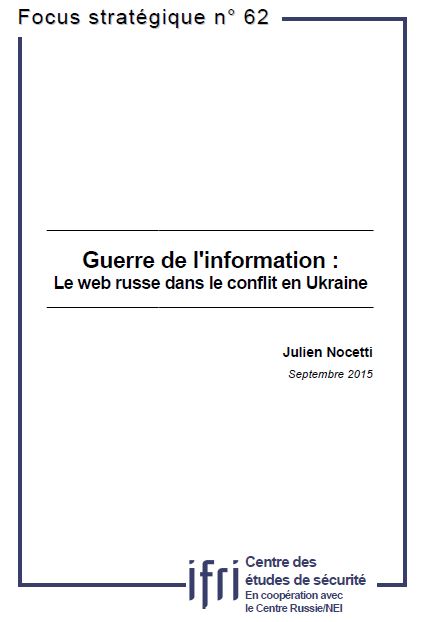Guerre de l'information : le web russe dans le conflit en Ukraine

Since the beginning of the crisis in Ukraine, Russia has been waging an information war.
Russian information warfare reflects its perception of its relationship towards the West as being that of a state of permanent conflict which needs the use of alternative tools to weaken both the enemy’s will and the capabilities. Up to this day, Russian information warfare has followed two main lines of actions: tightening the control over the Russian internet, in order to prevent any scenario of popular uprising coupled with an activist use of the web; and undermining the objectivity of Western and Ukrainian media coverage of the crisis. Despite some successes at the beginning of the conflict, Russian heavy-handed propaganda techniques did not allow the Kremlin to influence the international media as much as the alleged ambitions and the current means could lead to expect. They are, on the contrary, harming Russia's image both in its Near Abroad and in the West.
This content is available in French: Guerre de l'information : le web russe dans le conflit en Ukraine
Related centers and programs
Discover our other research centers and programsFind out more
Discover all our analysesMapping the MilTech War: Eight Lessons from Ukraine’s Battlefield
This report maps out the evolution of key technologies that have emerged or developed in the last 4 years of the war in Ukraine. Its goal is to derive the lessons the North Atlantic Treaty Organization (NATO) could learn to strengthen its defensive capabilities and prepare for modern war, which is large-scale and conventional in nature.
"Iron Swords" A Military Analysis of Israel's War in Gaza
On October 7, 2023, Hamas' attack, dubbed “Al-Aqsa Flood,” caused a major shock and led Israel to launch the longest war in its history. Operation “Iron Swords” was notable for its unprecedented intensity, both in terms of the massive ground forces deployed and the firepower used.
Saudi Arabia’s Nuclear Temptations. Lessons Learned from Regional Instability
Saudi Arabia’s integration in the international arena and regional stability, notably through reducing its dependence on fossil energies, are crucial elements for the success of the Kingdom’s Vision 2030, the Crown Prince’s top priority. However, Mohammed bin Salman’s declarations in 2018 and 2021, indicating that “if Iran develops a nuclear bomb, we will follow suit as soon as possible”, combined with the recent strikes on key Iranian nuclear facilities, do not bode well for the future of the Kingdom, the region and the non-proliferation regime at large.
The Future of Air Superiority. Command of the Air in High Intensity Warfare
Air superiority, understood as control of the air, is a cornerstone of the Western art of warfare. It is a decisive condition, albeit not sufficient by itself, to achieve military victory, as it enables the concentration of air power toward the achievement of wider strategic objectives and protects other components from unbearable attrition levels. It is best achieved through the offensive use of air power in a joint effort to neutralize the enemy’s air power.













